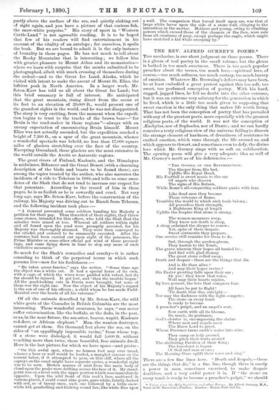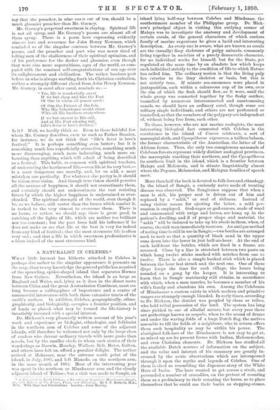THE REV. ALFRED GURNEY'S POEMS.* Too saccharine, is our short
judgment on these poems. There is a gleam of real poetry in the small volume, but the gleam is bathed in too much sweetness. There is too much popular preacher about the verses, too much love,—spiritual love, of course,—too much softness, too much ecstasy, too much luxury of emotion. Whatever Mr. Browning's defects may have been, he at least embodied a great protest against this too soft, too sweet, too perfumed conception of poetry. With his bard, rugged, jagged lines, he fell no doubt into the other extreme, but it was an extreme very salutary for the generation in which he lived, which is a little too much given to supposing that sweet emotion is the only thing that makes life worth living. That has not been the conception of poetry that has prevailed with any of the greatest poets, more especially with the greatest religious poets, of the world. It was not the conception of .2Eschylus, nor of Sophocles, nor of Dante; and we can hardly conceive a truly religious view of the universe failing to discern the strange element of hardness, of dreariness, of resistance to exalted emotion, which runs through the life around us, and which appears to thwart, and sometimes even to defy, the divine love which Mr. Gurney sings with so soft an exhilaration. The opening poem will give a very adequate idea as well of Mr. Gurney's merit as of his deficiencies :—
-THE GOSPEL OF THE RESURRECTION. The Sleeper from His bed.
Uplifts His Royal Head, His Footfall is sweet music to the ear Of angels who discern The signs of His Return, While Rome's all-conquering soldiers quake with fear.
Like dead men they become Those veterans of Rome, Trembles the world to which such tools belong ; All powerless their strength, A Righteous King at length Uplifts the Sceptre that alone is strong.
The women-mourners weep, They know not death is sleep, A sleep ordained the sleeper to renew; Yet, spite of their despair, Sweet ointments they prepare, One service still remains for them to do.
Sad, through the garden-gloom, They hasten to the Tomb, The grave wherein their hopes all buried lie ;
And find with glad dismay
The great stone rolled away; Death and despair—these are the things that die.
And is He then alive ?
And may their hopes revive ?
His Easter greeting falls upon their ear ; Ah yes ! they know that voice, Well may their hearts rejoice, By love possest, the love that conquers fear.
All fears be put to flight !
'Tis death that dies outright—
Nor may the darkness with the light compete ; The stone on every tomb Is ready to become A preacher's pulpit, and an angel's seat.
Now earth with all its blooms, Its music, its perfumes, God's cloister is, encompassing the shrine Where men and angels meet The Risen Lord to greet, Whose Presence turns earth's water into wine.
They camp on holy ground. They pitch their tents around
The sheltering Pavilion of their King;
The love-feast is begun Of God and man at one ;
The Morning Stars uplift their voice and sing."
There are a few fine lines here. "Death and despair,—these are the things that die," is a fine line, though there is surely a power in man, sometimes exercised, to make despair deathless, and a very awful power it is. If "the stone on every tomb is ready to become a preacher's pulpit," we should
• Voices from the Holy Sepulchre, and other POCTRS. By Alfred Gurney, 14.A., Vicar of St. Barnabas', Pimlico. London : Kogan Paul and Co.
say that the preacher, in nine cases out of ten, should be a much gloomier preacher than Mr. Gurney.
Mr. Gurney's perpetual sweetness is cloying. Spiritual life is not all syrup, and Mr. Gurney's poems are almost all of them syrup. There is a poem here expressing evidently sincere love and reverence for John Henry Newman, which reminded us of the singular contrast between Mr. Gurney's poems, and the preacher and poet who was never tired of telling men of the shallowness of their spiritual optimism, and of his preference for the darker and gloomier, even though they were also more superstitious, ages of . the world, as com- pared with the constant self-congratulations of our age over its enlightenment and civilisation. The rather luscious poet before us who is always warbling forth his Christian exultation, strikes a strangely different chord from John Henry Newman. Mr. Gurney, in carol after carol, reminds us :—
"Yes, life is wonderfully sweet If we but clasp and kiss the Feet Of One in whom all graces meet :
Of One the Fairest of the fair, Who His Inheritance would share With all His brothers everywhere.
If we but answer to His call, And at His Foot adoring fall, Life's fever is love's festival."
Is it? Well, we hardly think so. Even to those faithful few whom Mr. Gurney describes, even to such as Father Damien, for instance, we do not think that "life's fever is love's
festival." It is perhaps something even better ; but it is something much less superficially attractive, something much more discouraging, much more indurating, much more ex- hausting than anything which will admit of being described as a festival. This habit, so common with spiritual teachers, of underrating the hardness of life,—even life at its very best,— is a most dangerous one morally, and, let us add, a most mistaken one poetically. For whatever else poetry is, it should be vision, true vision. And though true vision should perceive all the sources of happiness, it should not overestimate them, and certainly should not underestimate the vast resisting forces by which the higher happiness is undermined or over- clouded. The spiritual strength of the world, even though it be, as we believe, still vaster than the forces which combat it, is tasked to the very utmost to overcome them. There is no harm, or rather, we should say, there is great good, in -catching all the lights of life, which are neither too brilliant
nor too constant; but the poet loses half his influence if he does not make us see that life at the best is very far indeed
from any kind of festival ; that the most strenuous life is often very sad ; and that a life in which sweetness predominates is s Adorn indeed of the most strenuous kind.



































 Previous page
Previous page